Allison Pearson meets Nigel Farage: ‘Kemi Badenoch was very unpleasant’
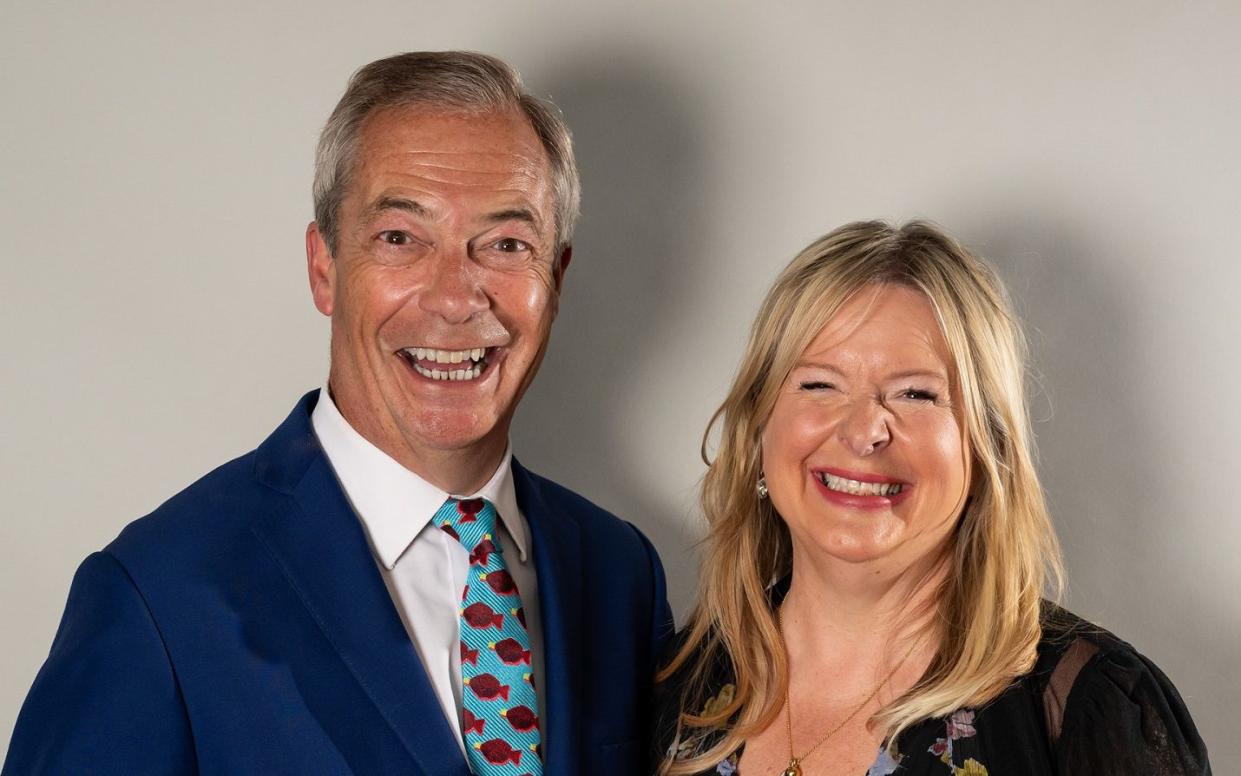
“Nigel!” “Niiiige!” “Hey, Nige, can I get a selfie?” “You could be prime minister next week!” “Nigel, good on you, mate!”
Something is happening out there. Or so Nigel Farage keeps saying. Is it? I’ve come to Clacton to try to find out. It’s a blissfully sunny Saturday morning in Frinton-on-Sea (the posher end of this Essex seaside constituency), where I am witnessing the ‘Farage effect’ first-hand.
As we walk down Connaught Avenue, full of bijou shops, the leader of the Reform UK party, a hate figure to many, is hailed from both sides of the street as a conquering hero. A striking 60-something mixed-race lady, elegant in coral jacket and matching lipstick, is among those in hot pursuit of the surprisingly slight, impeccably dressed figure. “Will you vote for Farage?” I ask her. “Yes,” she replies decisively, “but don’t tell my husband.”
Farther along the road, outside a fancy spa, a blonde woman with two little ones in tow, murmurs, “He’s handsome.” When I start to write that down, she hastily amends it to “dapper”. “He’s dapper, isn’t he.” The mum confides that she, too, will be voting Reform on July 4. “But don’t tell my husband, he can’t stand him.” Is this a previously unknown voting bloc: Shy Tory Wives for Nigel?
It’s not just females falling for Farage. The men, if anything, seem even more smitten, queuing up to get his signature on a Reform party leaflet. A middle-aged couple pull their car over and wind down a window to wish him luck. In a walkabout that lasts an hour and a quarter, during which he must have shaken at least 100 hands, I hear only two dissenting voices. The manager of a charity shop asks Farage to move on because “You’re bad for business”. And a 20-something guy angrily challenges Farage over his observation, during a BBC Panorama interview with Nick Robinson, that the West provoked Putin into invading Ukraine by ignoring Russian concerns about Nato expansion. The remarks caused a furore in the media (grateful for any opportunity to take down the cocky insurgent) and appear to have triggered the first downward dip in the polls for Reform, after it had briefly overtaken the Conservatives. But geopolitics holds little interest for voters here today. “Stop the boats” is the concern voiced most often and Farage, who didn’t go to university, could win Mastermind with that specialist subject.

I notice Farage is perfectly happy to stand on the pavement and debate his critic about the invasion of Ukraine for several minutes, even though two bodyguards with earpieces are hovering anxiously. Farage is brave. He has twice been physically assaulted during this campaign. When a milkshake hit him, Sky News called it “humbling”. (Typical of the unsympathetic coverage he routinely receives.) How different the tone would have been had a milkshake been thrown at the Labour or Conservative leaders, although there was no chance of that. Both Rishi Sunak and Keir Starmer have conducted dull, prophylactic campaigns, speaking largely to supporters in sanitised environments pre-swept for members of the public with awkward opinions. (“The bland leading the bland,” quips Farage. “Without humour and meeting people, there’s no bloody point”.) At least here, with a salty breeze off the sea whipping up a frisson of excitement, you get the sense of what election campaigns used to be like when politicians were still prepared to engage robustly with their voters instead of harvesting them by algorithm.
Occasionally, Farage fans can be unhelpful. “You’re the next best thing to Enoch Powell,” shouts a heavily tattooed man in the Frinton crowd. Farage does not acknowledge the remark. Powell was a hero of the young Nigel, but at this point he could do without any association with the politician who made the notorious Rivers of Blood speech. Because of his stand on immigration, the accusation of racism follows Farage and his party around like a bad smell.
Sure enough, on Friday, Channel 4 claimed to have carried out a sting on one Reform canvasser (not even a candidate) who was filmed calling Sunak vile names and suggesting the Army should “just shoot” migrants crossing the Channel. The weird, foul-mouthed caricature was nothing like the cheerful volunteers I met at Reform HQ above an amusement arcade in Clacton: Holly and her 15-year-old son, who was excited to report that Reform had won the mock general election at his Kent secondary school; a Northern miner who used to vote Labour; a gay couple down from London to help; husband and wife with an opinionated dachshund called Biscuit. It has been alleged that the canvasser is actually an actor who usually speaks in received pronunciation but “turned up in our office like something out of an Alf Garnett sketch”, according to Farage. When we speak on Monday morning, he calls it “the most enormous stitch-up I have ever seen. I am struggling to control my anger”.
Reform has reported Channel 4 to the elections watchdog over “scandalous election interference”. But Channel 4 are standing by it and the story had already got legs, with Sunak saying he was “hurt by racial slurs”. Then, over the weekend, the BBC produced a Reform candidate who had defected to the Tories out of disgust with the allegations of racism. And there was a second on Tuesday, Georgie David, who claimed the “vast majority” of candidates for Farage’s party are “racist, misogynistic and bigoted”. (Presumably not including the Sikh candidate in Feltham, sporting a turban in Reform turquoise, who has had his posters vandalised.)
Farage snorts in disbelief when I ask him about the reported defections. “Ha! They’re bribing them to say they’re standing down.”
Who is “they”, Nigel?
“Conservative candidates who are so desperate to hang onto their seats they’ll literally do anything to discredit Reform.”
He says that, before the 2019 general election, he was happy to go inside the Conservative tent, offering his services in the Brexit negotiations. (“No one knew more about Brussels than me.”) But the Tories turned their noses up. Instead, they offered Farage 10 peerages and a knighthood for himself, he claims, if he would stand down Brexit Party candidates and endorse Boris Johnson.
“In the end, I stood down our candidates because I didn’t want Corbyn in No 10. They could shove their knighthood.”
On Friday morning there will be a lot of humbled Tory ex-ministers and ex-MPs who will dearly wish that their government had cut a deal with that “ghastly” Farage man. What fools Conservatives were to underestimate and spurn one of the most important and gifted politicians of the modern era. More influential than many prime ministers, certainly the luckless Sunak. Nigel Farage, rebel-rouser extraordinaire, is the only man to ever have won a national election as leader of an insurgent party and, as Michael Crick points out in his superb biography, One Party after Another, Farage managed that remarkable feat twice, five years apart, while leading two different parties. (The 2014 European elections as the leader of Ukip, and the 2019 European elections as the leader of the Brexit Party.)
Now he is back, tormenting the Tories again, gleefully picking up millions of voters who he says are disgusted with a party that has betrayed them with mass immigration, threatening their culture, their values and their history.
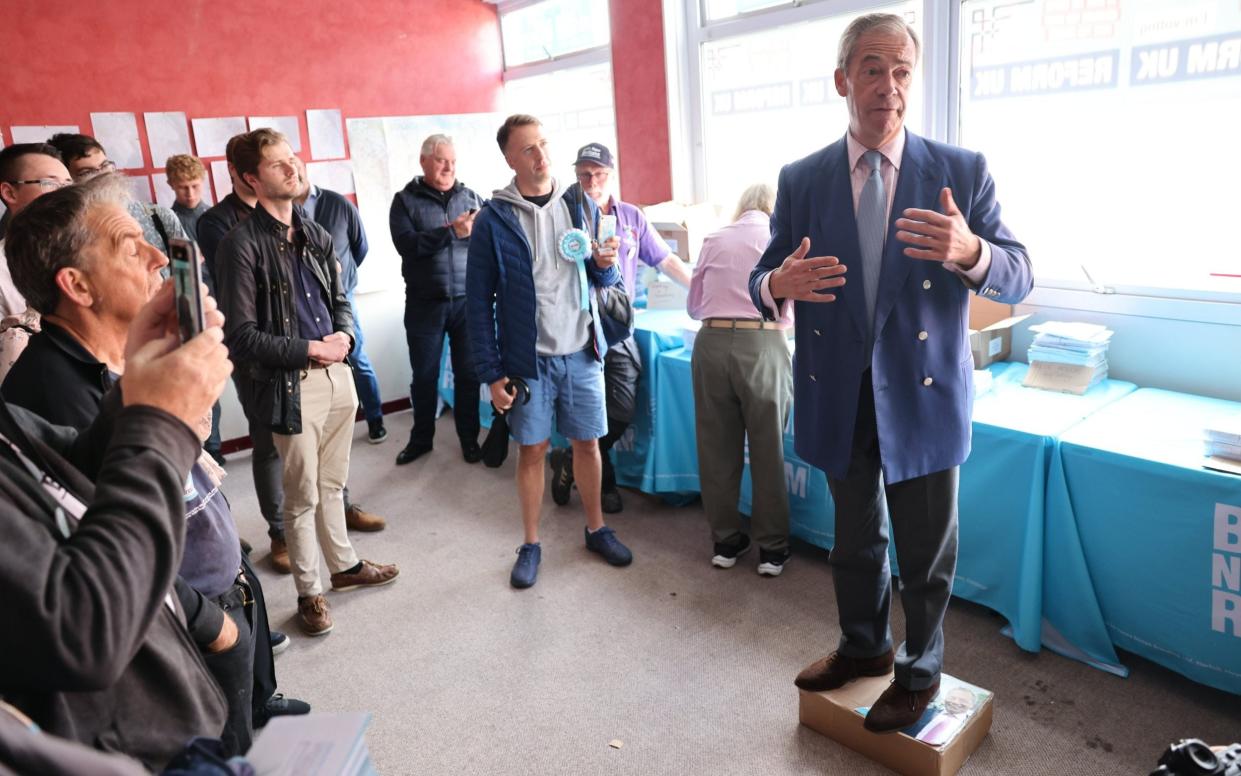
“It feels to me like we’re going to do better than anyone can imagine,” Farage says – and I think he believes it. (“The best reader of the political tea leaves”, a Tory big beast admits bitterly.) The way the polling companies handle the undecided voters, of whom there were between one and three million, is to weight them back to the last general election. “That downplays us by about 3½ per cent,” muses Farage. “So we’re probably talking about 20 per cent of the vote.”
Blimey. Twenty per cent for Reform would not send a tremor through Westminster; it would be a political Krakatoa. All these recent smear stories remind me of Brexit at the point where a Remainer establishment was becoming alarmed that the upstart Leave campaign was doing too well.
“This is how it always goes whenever Nigel stands for election”, sighs Alex Phillips, Farage’s close friend, former aide and Brexit Party MEP. “It’s so predictable – Russian interference, racism, secret filming, dodgy candidate. Then, bam! Nigel is a monster, finish him off.”
They won’t get rid of him that easily. Friends say Farage has mellowed. Nowadays, we see little of the brash, hard-living, loadsamoney city metals trader. (When he first won a seat in the European Parliament, an interviewer warned: “You’ll find a never-ending round of invitations to lunches, dinners, champagne receptions. Do you think you’ll become corrupted by the lifestyle, Nigel?” He replied with a grin, “No. I’ve always lived like that.”
His superb presentation skills have been honed and softened a bit on his primetime GB News show, where producers marvel at his ability to work without an autocue. (He just won a second TRIC award for best news presenter and was booed by a TV-biz audience, for whom Farage’s popularity must be infuriating if not yet chastening. He couldn’t care less; luvvies’ tears are nectar to Nigel.) His appearance last year on I’m a Celebrity… Get Me Out of Here (he came third) revealed an immensely self-disciplined man who threw himself into every challenge (I’m told he was disappointed that physical limitations, the legacy of a near-death plane crash, meant he couldn’t always perform as well as he wanted to). Surprisingly private, with an old-fashioned reticence when it came to talking about himself, the one thing he couldn’t quite hide was his control-freakery. The only emotion Farage showed in the jungle (apart from a slightly awkward hug he gave his daughter Izzy, who was teary-eyed at seeing her dad) was a prickly irritation when fellow campmates failed to leave the cooking area tidy overnight. He likes things shipshape does Nigel.
Back in Frinton, while Farage has a brief pitstop in Greggs (hot sausage roll, coffee) and scrolls through the hundreds of emails that arrive hourly on his phone (including a large potential donation to Reform from a wealthy individual’s private office), a former RAF fighter pilot comes over to him and says that all his military mates agree with Farage about the EU provoking Putin. “I won’t be voting for you,” the retired pilot says, “but I just want you to know you’re spot on about that.”

When I ask him if he regrets his Putin remarks, he stubbornly digs in, pointing out that David Cameron and George Osborne foolishly cosied up to China, Tony Blair invaded Iraq and Lord Cameron (he says “Lord” with a barked laugh of incredulity) caused a shambles in Libya and is responsible for tens of thousands of North Africans coming across to Britain in small boats. Fair enough, but there’s no doubt the Russia comment was an unforced error: it put off a lot of ex-military types who might have voted Reform. (Richard Tice, the former leader and now chairman of Reform, was not thrilled about it, I reckon.)
Farage is right: something is definitely happening here. No other politician, except Boris, could command this kind of rapturous reception I witnessed. Farage was predicted to do brilliantly in dilapidated Clacton, but genteel Frinton was meant to be a true-blue stronghold. Although Giles Watling is defending a 24,702 majority here, like most Tory seats it is about as safe as a sandcastle at high tide. Farage says he thinks Frinton is “very Walmington-on-Sea”, the fictional setting of Dad’s Army (there can be no higher praise in Nigel’s Ladybird book of Nostalgia). The day before I got there, the Clacton constituency poll, conducted by JL Partners, had Farage on 48 per cent, 27 points ahead of Watling. He led in every age group apart from 18 to 34-year-olds, and only one in five 2019 Conservative voters was sticking with the party.
Seven times, Farage has stood for the House of Commons – in five general elections and two by-elections – and seven times he has lost. This time, there is little doubt that he will fulfil his promise to go to Westminster and “make a bloody nuisance” of himself.
As Farage leaves Greggs, a group of boys on the other side of the street shout, “It’s that bloke off TikTok!”, greeting him with whoops and cheers. (One reason Farage agreed last year to do ITV’s I’m a Celebrity… was to reach younger voters. It worked. He now has 814,000 followers on TikTok, 14 million likes and has become a bit of a cool uncle on the kids’ favourite social media platform. Starmer should think carefully before lowering the voting age.) The teenagers cross the road and, suddenly bashful, approach Farage. “Is he God?” wonders one aloud, and Farage gives his trademark milk-frother laugh, a spittly sound sticky with nicotine. “Behave yourselves, boys,” he says, clearly delighted.
Farage looks less like the Almighty than a spiffy Wimbledon umpire in blue blazer with silver buttons, blue shirt, patterned tie and grey slacks. His Camp Coffee tan is a lot more flattering than his friend Trump’s terracotta bronzer. Armed with a gameshow host gregariousness (Bob Monkhouse comes to mind), he even has a catchphrase: “Tell you what…”

“Nigel is old school,” says a colleague at GB News. “He thinks dressing well and making an effort is a sign of integrity and respect for voters.” I’m told that Farage’s girlfriend, Laure, who organised his 60th birthday party in April, has got him eating properly and exercising, though she has her work cut out with the booze and the ciggies. A 40 pack of Rothmans punctuates any conversation you have with Farage.
The leader of the boys chirps, “I’m gonna vote for Nigel.” He is crestfallen when we tell him that, at 14, he’s too young.
“Not short of cheek is he?” beams Farage, who is hardly lacking in that exuberant, rude commodity himself. In fact, Boy who Pointed Out the Emperor Has No Clothes is practically the job description. Only Farage has dared to suggest during this campaign that the NHS is broken and we must copy a system like France has, that works; the UK is “skint” and the national debt must be reduced; the net zero target is ruinous and mad; the second and third lockdowns were the worst policy mistakes in British history; schoolchildren must not be taught that their history is uniquely evil or that girls can become boys; the needs of British people must come before those of migrants. No wonder the shameless and the naked hate him for pointing out what they will not.
The security team signal that the walkabout has to end (an anti-racist group has arrived in Clacton and tracked down Farage on social media. We have to move quickly because there have been death threats). Just as we are about to climb back into a Range Rover with blacked-out windows, a young lad, who has been hanging back, draws near. Sam, aged 18, looks like the kind of slender, fair-of-face youth that ran into the guns at Passchendaele. I ask him why he has come to see Farage. Sam says his grandad, who was 98, died a week ago and the old man often told his grandson about his time with Lancaster bombers during the war. “He talked about this country that pulled together,” Sam says, “and I think we’ve lost that.”
Sam is learning to be a carpenter. What does he think of Sunak? “T---.”
Starmer? “T--- who will make the wokeys worse,” he says, “These people talk about gender. In school, we got it the whole time,” Sam says, “Me and my mates, we hate it. Shut up! I don’t tell anyone what I do in bed with my girlfriend, why do we have to hear what they do? It’s not normal.”
I touch Farage on the shoulder and say that a young man would like to meet him. He turns and stretches out a hand to Sam who, face to face with his hero, stammers out his thanks. I won’t forget the look on Sam’s young face; call it gratitude, a yearning for something that he knows is missing but can’t quite place. Is Nigel Farage really the hero this lad is looking for; is he a worthy vessel for all that hope?
Sam, why do your generation like Nigel?
This time, there is no hesitation. “Because he’s not afraid.”
You cannot understand Nigel Farage without knowing he almost died three times. A car accident in the 1980s, testicular cancer, and a plane crash (caused by a Ukip banner that wrapped itself around the tail of the two-seater aircraft) on election day in 2010. The latter left him with a punctured lung, a fractured sternum and several fractured ribs. He has never fully recovered from his back injuries and, every so often, I see him wince in pain. Friends say it has given Farage a carpe diem mentality whereby he will take risks and often do the radical, untested thing rather than the safe option. “I’ve considered myself, ever since that moment, very, very lucky to be alive,” he said, “and if before that crash, in politics I was unafraid to take on the Establishment, since that day I’ve been fearless.”
The minute we are inside the Range Rover on our way to the next appointment, Farage fastidiously applies hand sanitiser and strikes up a cigarette. Does he have any sympathy for Rishi Sunak, who is facing one of the greatest humiliations imaginable?
“I’d like to feel sympathy, but Rishi’s so dishonest. I mean, the spinning, Allison. They were putting out on social media the other day that Tories have cut the numbers of people crossing the English Channel. Really? It’s about to hit 50,000 illegal migrants since Rishi became PM. And, oh, they’ve cut NHS waiting lists apparently. There’s no real frankness or honesty, it’s all spin. Rishi says, ‘We’re the party of low tax’, well, just look at their 14-year record. I mean, on a human level, of course, it’s horrible for Rishi. But it doesn’t affect him, does it, they’re worth a billion. He can b----- off to California.”
Farage says the differences between Labour and Conservative are pretty marginal. “A change of middle management,” was his scathing description of the general election before the 5,000-strong crowd at a Reform rally at the National Exhibition Centre in Birmingham on Sunday. “They agree on net zero. Their immigration status policies are pretty much exactly the same. One supports the Rwanda policy, the other is cracking down on the criminal gangs, but neither will work. Both are going to put more and more money into the NHS even though it’s broken. There’s this petty routine, ‘You’re gonna put up taxes £2,000’, ‘You’re gonna put up taxes £3,000’. No substance to any of it. The country’s skint and they have no plans to cut expenditure and bring down the debt as Reform has.”
But what about the true-blue Tory MPs, Nigel, like Suella Braverman, Priti Patel, Danny Kruger, Kemi Badenoch, Karl McCartney in Lincoln, Liz Truss, your friend Jacob [Rees-Mogg is threatened with a loss in North East Somerset]. There’s hardly a fag paper between you and them on policy. Why couldn’t you stand down Reform candidates in their seats to give them a chance of winning, so at least there would have been a kernel of sound Right-wingers in a Labour-dominated Commons?
“Oh, we’ve done all that before,” Farage says crossly. “I’ve had 25 years of doing them favours, 25 years of standing aside in elections for various members of Parliament. In 2019, I stood aside for them in 317 seats. What have they ever given me? No chance. No chance! When it comes to it, even the good guys, it’s party first. Always party. None of them have the guts, frankly, to man up and do what’s needed.”
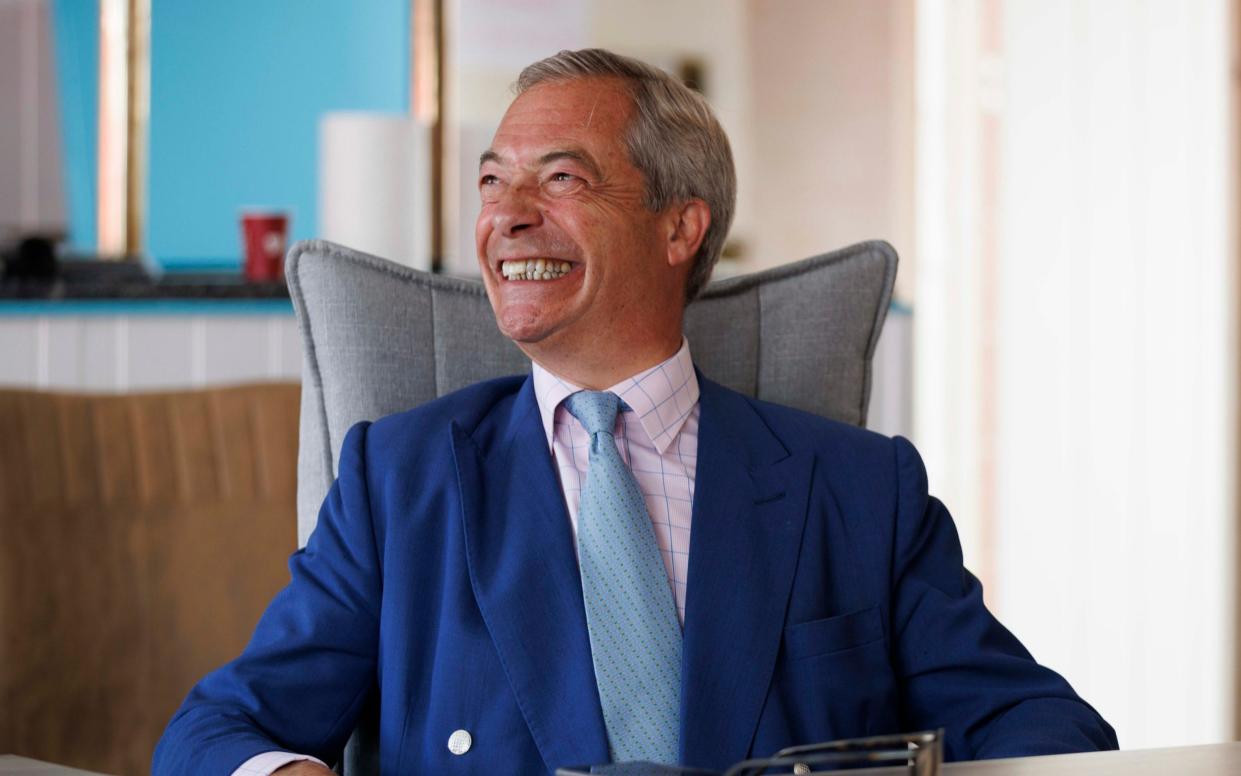
He surprises me by singling out Badenoch, a hotly tipped contender to be post-rout Tory leader, for criticism. “She’s very unpleasant,” he says. “[Hotelier] Rocco Forte threw a party at Brown’s [Forte’s Mayfair hotel] and I was looking forward to talking to her, but we had a really unpleasant exchange. It was a social event, a happy evening, but Kemi was really aggressive towards me. She was like, ‘How dare you? If you come back, you’re going to split the vote, you’ve got to realise that you’re going to let us down very, very badly’.
“I said to her, ‘You’ve got no divine right to this, Kemi. The Conservatives have no God-given right to rule. That was what Charles I thought and look what happened to him!’”
Ouch. Did she take the point? “No, she was adamant. We didn’t even part on a pleasant note, which was hard. And I thought her attitude, well, in a way, that’s very revealing – and I won’t forget it in a hurry.”
Gosh. Sounds like the realignment of the Right is getting off to a slow start. Badenoch has gone on the offensive, saying Reform switchers are “good people” but don’t realise what they’re voting for (I recall similar condescension towards us thicko Leavers). Farage, she claimed, was “like the wolf in the Three Little Pigs. He’s not coming for a cup of tea.” As the Conservative Parliamentary party is about to trade its ancient manor house for a leaky Portakabin, I’m not convinced it is in any position to demonise the man who is building a major, national centre-Right movement. Nor can I see Farage being anything other than the leader of whichever Right-wing party they end up with, because he’s such a control freak. One former colleague recalls an important meeting where Farage, who was chairing, was simultaneously on the phone to stationery companies and the like about office trivia. “Not a delegator.”
(It’s hard to see how that one-man band becomes an orchestra.)
The humiliation of Macron in France has only strengthened the impression that the frictionless elite Davos class of liberal globalists, with their open borders, multiculturalism, lack of concern for community cohesion and condescension towards “populism”, is on the run. Farage says the similarities between Reform and Marine Le Pen’s National Rally party are not economic – “she’s very Left wing, the state is everything to them” – but cultural ones.
“What is it to be French? The real reason Le Pen is doing so phenomenally well is the French people are furious about the explosion of rape and crime where many migrants are implicated,” Farage says. “We are not there in this country – dare I add ‘yet’? French people say they don’t feel safe anymore. Parts of Marseille and northern Paris are no-go areas. The crimes against women are horrendous. And suddenly, the egalitarian French are saying, ‘This has to be stopped’. They’ve let a lot of people into their country who don’t like France very much. When Le Pen sees people kneel in the street on Friday lunchtime to pray, she says, ‘Is this France?’ And millions agree with her.”
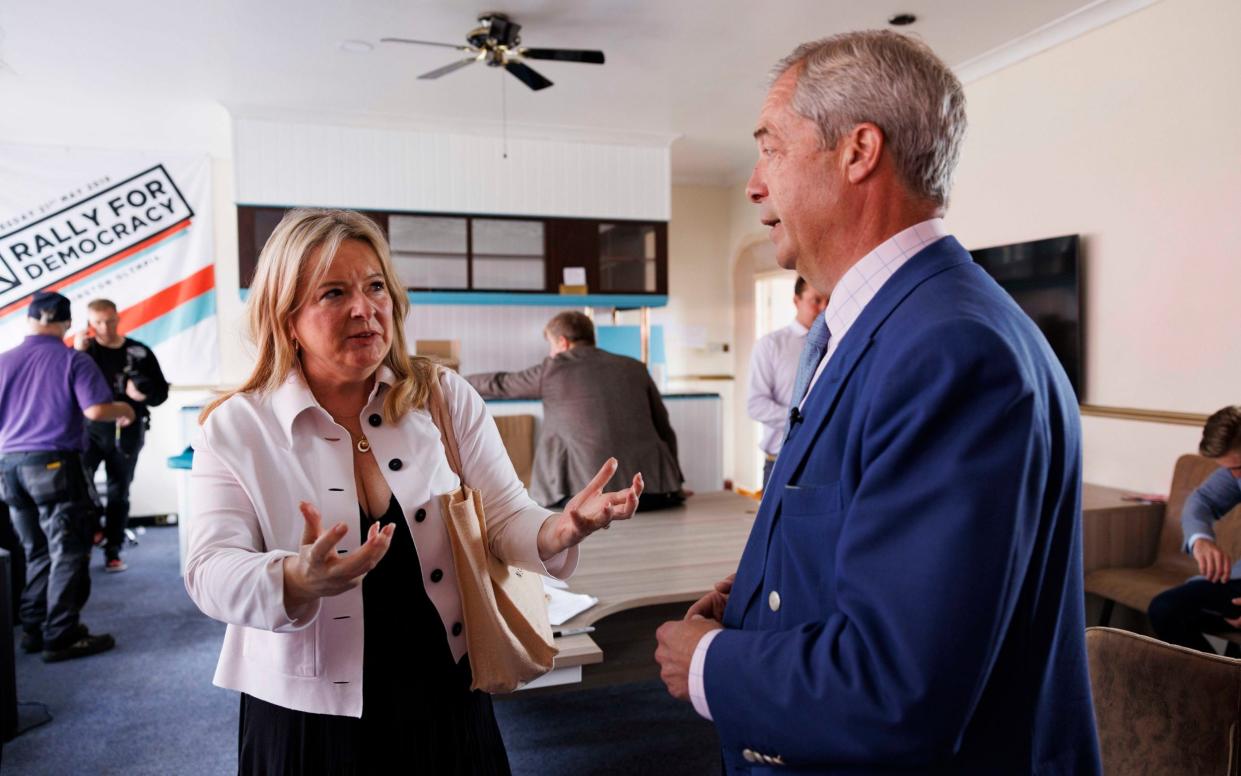
That is getting pretty close to the boundary of what it’s acceptable to say. (That “dare I add yet” is deliberately provocative.) Farage has tried for years to shrug off the charge that his parties are more than “the BNP in blazers”. He likes to claim that he actually defused the threat of the hard Right taking root in Britain. Maybe. Still, although I don’t think Farage is a racist, it’s a problem that racists attach themselves to Reform.
When I tell him that a friend of mine (a managing director and another Shy Tory Wife) told her family she was voting Reform and her son accused her of being a racist, Farage gives a two-shouldered Gallic shrug. “Look, I’ve seen all this over 20 years, Allison. At times, I’ve been the sole voice arguing that immigration leads to a decline in living standards for British people. Of course, this has been the Left’s technique. Those who want to break down the idea of country, of borders – the old Trotsky idea that we’re all global citizens – what they do is attack anybody who dares to stand up against it. And the problem is that most of these problems are caused not by the Left but by Conservative cowardice, the sheer cowardice of those Tories who want to be invited to the right dinner parties in Notting Hill. So I’m quite used to that level of prejudice being displayed against me.”
Some of the attacks on him are so disproportionate they’re funny. “Farage’s Essex putsch is the new ‘Project Fear’ – a fear of change, of immigrants and of the modern world,” blared one Guardian headline.
Farage thinks Britons are finally waking up to the fact that debating immigration is legitimate not racist, although the media are way behind the public. He says he hears the accusation far less than he did 10 years ago. “I think you will find that the sort of Marmite reputation I’ve got, the number of people who really think I’m a bad dude, is a lot less than it was. In life, if you go against the status quo on anything, you’re always going to be painted by those who support the status quo as mad, bad and dangerous. And that’s just the way human beings are. I mean, to be honest, I couldn’t care less.”
And that, ladies and gentlemen, is Nigel Farage’s magic power: he couldn’t care less.
In her victory speech on Sunday night, Le Pen said, “Democracy has spoken, seven years of looking down on citizens will come to an end.” It could have been Farage talking. He says 2016 was the beginning of the populist wave. “They all wanted it to be an aberration. I think it’s barely started.”
Ironically, he believes a Starmer government is the best option for populism’s success in this country. If a Tory government was to be re-elected, it would go on pretending it was Conservative, which would muddy the waters, he says. At least with a Labour government, the British people will see what a liberal, statist, high-taxing, woke, women-have-a-penis, open-border government looks like. He thinks Labour will be in trouble within months because most of Starmer’s front bench are “hopeless”, out of their depth.
The opposition to Labour won’t be in Parliament, Farage says; it will be in the country. Brexit began as a grassroots movement and he plans to build another mass movement in all parts of the country, ready to challenge Labour in 2029.
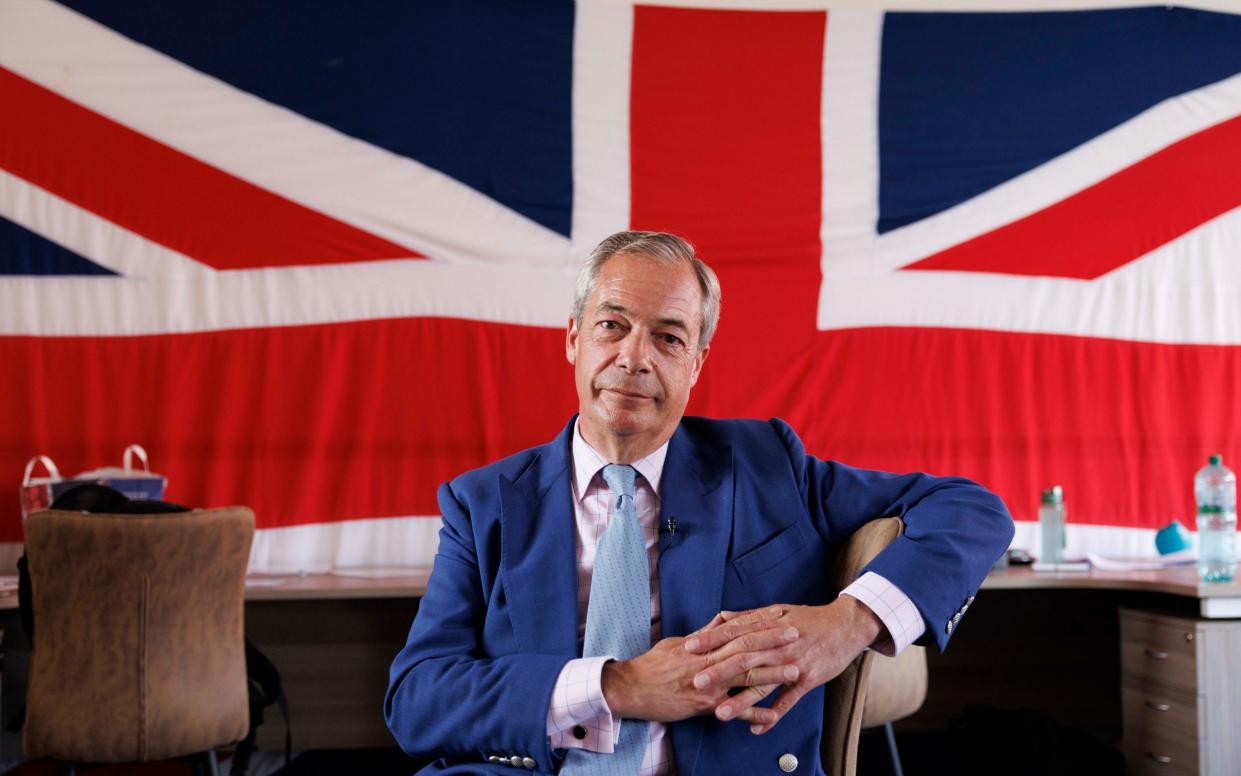
There is no doubt that Farage provides an infuriating contradiction for his critics. A Little Englander who married a German woman (his two daughters are bilingual) and, since that marriage ended, has had a longstanding French girlfriend. He is “racist and homophobic”, yet his closest colleague at GB News is a mixed-race gay man he clearly adores and who adores him. The Reform party is “anti-immigrant,” yet it is standing a large number of non-white candidates in the general election and its biggest donor is Zia Yusuf, a Muslim tech entrepreneur, who told the event at the NEC that “Britain is home to the warmest, most welcoming people in the world… and immigrants are attracted here because of British values like equality under the law and freedom of religion”. So, not quite the racist, colonialist hellhole the Left likes to claim, then?
Just a mention of the name “Nigel Farage” can send a shudder through polite company. But why? What is uniquely awful about this immensely affable man, a huge enjoyer of life, who is far more authentic than most political leaders I have interviewed? Why is he a byword for bigotry? “I don’t think those things even cross his mind,” says Phillips. “He’s got friends of all races and backgrounds. The only thing you can accuse him of is wanting to protect the culture and history of his country – to some, that is racist or xenophobic, it seems.”
My guess is that Farage is a proxy for class hatred. Polls show that the majority of people in this country, on Left and Right, broadly share his views on immigration and defending British traditions. This makes those who don’t – the liberal, university-educated minority – uneasy. They wouldn’t dare attack the plebs for their views, because it would reveal them to be snobs (because they are snobs). But it’s safe to demonise Farage, the City slicker, the blokeish caricature who enjoys a pint or five and is a human piñata they can beat while not questioning their own hypocrisy. That’s why when Farage spoke in the final BBC election debate, he was asked only hostile questions (“Why are you spreading fear?”) and was met with a sullen silence from the audience that in no way reflected the affection and enthusiasm I saw with my own eyes. Nor did it capture the polling which yesterday had reform back on 17 per cent after the Russia blip.
“We were Labour,” said a lovely Liverpudlian couple I met at Reform HQ in Clacton, “but we need Nigel, we need a strong man who can talk a good game. Someone who can speak for us.” Yes, they do, and yes he does.
Like many traditional alpha males of his background, Farage is suspicious of emotion. When I ask him for things that make him cry, he bats the question away, embarrassed. Two days after we meet, he texts me to report triumphantly that he has been moved almost to tears. “When I announced the birth of my first grandson on stage on Sunday.” He jokes he will never forget the boy’s birthday. Well, it was the anniversary of the Brexit vote.
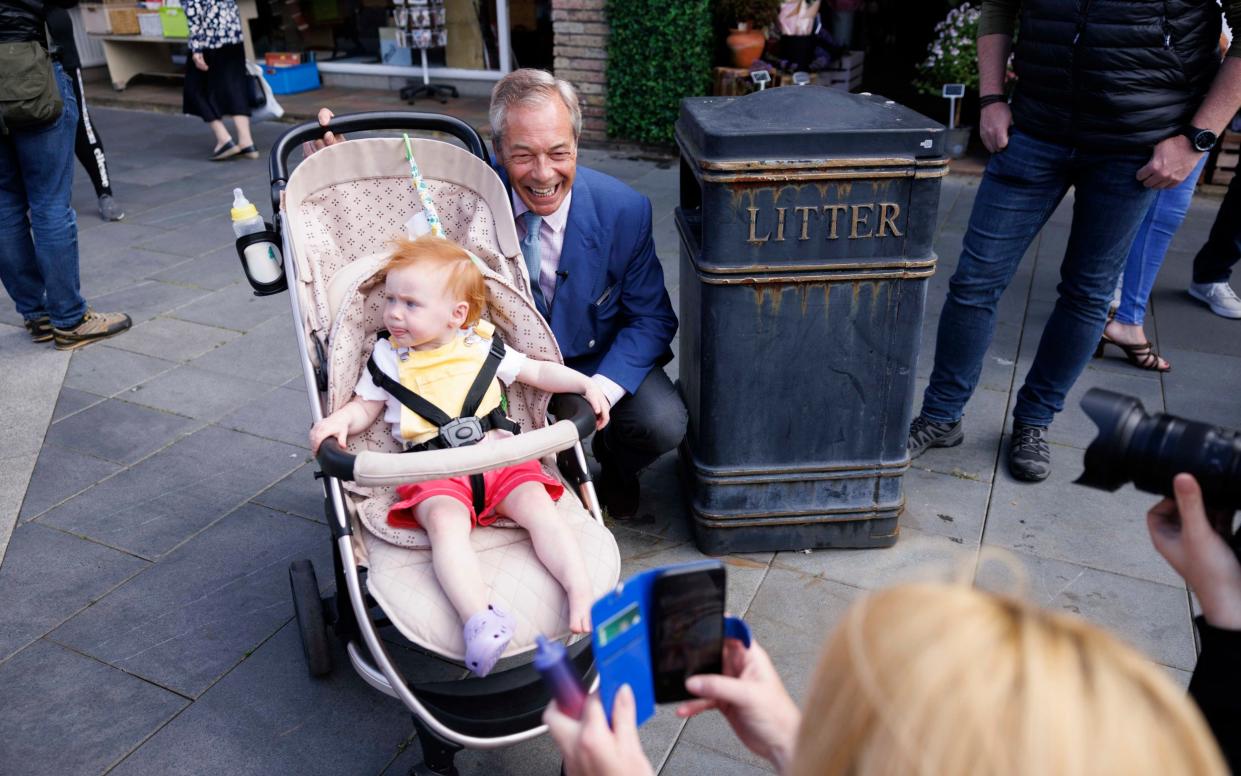
His background is often described as privileged, but it wasn’t all plain sailing. Nigel’s parents, Barbara and Guy (“The best-dressed man in the City”: sartorial standards can be hereditary) got divorced in the 1970s at a time when that was still a source of shame. Typically, the bumptious young Nigel (“God, I was a nightmare”) put it about at prep school that only top people had divorced parents. His bravado hid some hurt, I think. Guy Farage was an alcoholic and Nigel and his younger brother, Andrew, were not allowed to see him for a while. His mother was a hugely outgoing, eccentric woman who posed practically nude for charity calendars (“Still likes to enter a room in her 80s and be the centre of attention,” Farage says fondly).
“Nigel is devoted to his parents, but they weren’t the easiest,” says a family friend. That makes sense. There is something of the orphan about him and about the young men who make up Team Farage. (He really could do with some female advisers.) “Fagin’s gang in Oliver Twist,” is one striking description of that macho set-up. Lost boys looking for a hero.
There is one thing Farage didn’t tell me but a friend did. His dad has been very ill in hospital these past few difficult, demanding weeks. He won’t eat. Nigel asked his father if there was one thing in the world he could eat what would it be? “Oysters from Chichester,” Farage Senior replied. So Nigel took a break from the campaign drive to get the oysters and brought them back to feed to his dad.
He won’t be happy I’ve told you that story. In fact, he’ll probably hate it because it’s not something he can dismiss with that milk-frother laugh. But it’s something to bear in mind when you next see the supremely confident Reform leader.
Not an easy man to fathom, Nigel Farage. A workaholic who is always up for fun (“How many pubs are we visiting tomorrow?”), ruthless but capable of great kindness, not a frog but a shark, a Barnum, a gifted ringmaster who makes the show go on, a big character but recessive, protective of his family but willing to get back in the ring and take more blows himself. Resilient. A ladies’ man but a hard dog to keep on the porch. An astounding Rain Man ability to remember facts but also to talk to anyone. Wealthy enough to be able to enjoy a comfortable life with his television career and American speaking engagements, but coming back once again to stand as an MP out of a sense of duty. Because when he was at the D-Day commemorations (and unlike Rishi, stayed until the end) he asked himself what all those boys would think now about the country they died for.
It was said of Charles Dickens, “He didn’t give the people what they wanted; he wanted what the people wanted.” That is the secret of the success of Nigel Paul Farage.
There is one highly revealing passage in his memoirs when he looks back on himself as a schoolboy: “Whenever I encountered interventionist authority, I was at the forefront of the dissidents, whenever I encountered unthinking acceptance of doctrine, whether about the news or history, I challenged it fiercely… whatever my own views, I would champion any neglected damsel in distress amongst ideas against the dragons of prejudice… I fought fiercely for anarchy, CND doves and warmongering hawks, Christianity, atheists, the pro and anti-abortion (NOT pro-choice and pro-life) feminism, chauvinism… This was not me puppy play fighting, I had discovered in myself a passionate loathing of received opinion.” That boy has never grown up. Long may he be a bloody nuisance.
At the end of a packed, tiring day, when we are in the pub – where else? – I remind Farage about Sam, the lovely lad we met earlier whose grandad died and who had sought out Farage, looking for something.
Why on earth are you, Nigel, worthy of Sam’s trust? He sets down his pint. “I have many failings, but I am courageous. I will fight and fight anyone who needs fighting and I will bloody well go on fighting.”



